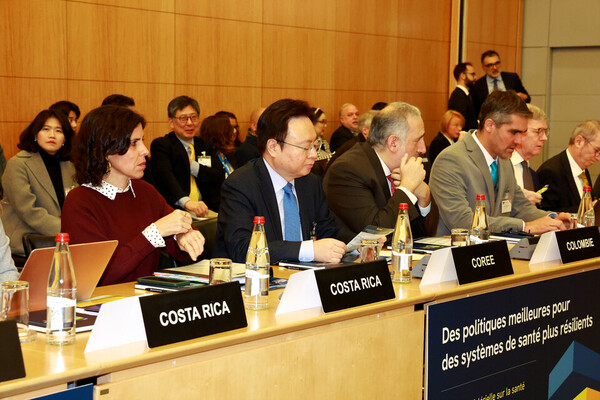The Minister of Health and Welfare, Cho Kyoo-hong, highlighted the necessity of augmenting the medical school enrollment quota in Korea during the health ministers’ meeting of the Organization for Economic Cooperation and Development (OECD).

The Ministry of Health and Welfare said Cho attended the OECD Health Ministerial Meeting in Paris, France, on Tuesday to deliberate on “better policies for more resilient health systems.”
The meeting addressed how countries can brace for future healthcare challenges based on the lessons from the Covid-19 pandemic. It focused on securing funding, fortifying interconnection and cooperation, and specifically discussed digital health, public health, mental health, pharmaceutical policy, and augmenting the health and social welfare workforce.
According to the ministry, Cho underscored the significance of securing healthcare personnel to enhance resilience and presented the Korean government's plan to support essential medical care. In particular, he engaged with health leaders globally to elucidate the imperative for Korea to increase the number of medical school students.
Minister Cho held meetings with OECD Secretary-General Mathias Cormann and Australian Secretary for Health and Aged Care Blair Comley on Monday.
During the meeting with the OECD secretary-general, Minister Cho expressed appreciation for the OECD's analysis and policy recommendations on strengthening health system resilience, and he heard about overall trends in key countries in enhancing health system resilience, including health workforce and digital health.
The OECD has recommended in its “Economic Outlook 2022 for Korea” report that more medical school students are needed to expand primary health care.
In the meeting with the OECD secretary-general, Cho expressed gratitude for the OECD's analysis and policy recommendations on fortifying health system resilience. He learned about overall trends in key countries, encompassing health workforce and digital health.
The OECD, in its "Economic Outlook 2022 for Korea" report, has advocated for more medical school students to expand primary health care.
Minister Cho introduced Korea's digital technology capabilities and trends in building and managing quality data and utilizing AI in healthcare. At the same time, Secretary Comley explained the trend of utilizing non-face-to-face medical treatment and prescriptions that have become more common since the pandemic.
In particular, Comley emphasized the need to secure the solidarity of localities and students to overcome the disparity in medical personnel by expanding the number of medical school students and mentioned the importance of estimating the supply and demand of healthcare personnel, according to the ministry.
Cho also met with Agnès Bocognano, director-general of the French National Office of Health Workers and Demographics (ONDPS), to discuss France's policies for reasonably estimating the supply and demand of medical personnel and securing human resources.
France has increased the number of medical school seats from 3,850 in 2000 to about 10,000 in 2020. In 2021, the ONDPS recommended that the French Ministry of Health increase the number of medical school seats by 20 percent from 2021 to 2025 compared to 2016 to 2020, based on the forecast for an adequate number of medical professionals by 2040.
Following his visit to France, Cho will travel to Japan to learn more about the Japanese government's efforts to secure medical personnel and input from experts and stakeholders.
Related articles
- ‘86% of junior doctors will strike if medical student number increases’
- Doctors express ‘regret’ at reports on sharp increase in physicians
- [Top 10 Healthcare News in 2023 ①] Korea to expand medical school quotas starting from 2025
- Medical community gears up for showdown as government mulls surge in medical school enrollments
- Government dispels election rumors surrounding medical school enrollment increase

